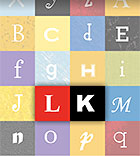“No name calling,” our mothers and teachers instructed. Actually, it’s pretty good advice. What does name calling really do for you anyway? Perhaps we can agree that name calling really has no place in an adult conversation. However, just as I have occasionally broken the rule in my home, maybe others of you have slipped as well.
When contemplating the ever increasing environment of openly hostile name calling, I have to wonder how these negative words came into play.
Take the word, ignoramus, which I rarely hear anymore. Maybe it’s fallen out of favor since it has more than four letters and one syllable. Nevertheless, Merriam Webster’s Dictionary and Thesaurus (2014 edition) defines ignoramus as “an utterly ignorant person.” For those of us that have used the word or heard the word, we’d probably agree with that definition. However, after opening my Black’s Law Dictionary (circa 1979) for the first time in over a decade, a different definition for this Latin-derived word is illustrated.
“’We are ignorant.’ ‘We ignore it.’ Formerly the grand jury wrote this word on bills of indictment when, after having heard the evidence, they thought the accusation against the prisoner was groundless, intimating that, though the facts might possibly be true, the truth did not appear to them; ….”
How “ignoramus” developed into an insult is a mystery to me. Was it ignorance or culpable ignorance of a few who made this legitimate noun into an utter insult? Who has the answer? Maybe this is a line item covered in one of the college courses like Comparative Communication Studies or the Sociology of Developing Insults.
Never having thought of Black’s Law Dictionary as a book of trivia, I may change my mind. Did you know that you can discover definitions for five general types of ignorance: culpable, essential, involuntary, nonessential or accidental and voluntary? What does it say about us that we need to define five separate types of ignorance? That may be a question for the ages.
For now the best advice I can offer comes from an Ancient Greek philosopher and scientist. The next time someone hurls an insult about a lack of intelligence, consider what Democritus mused, “I alone know that I know nothing.”
Just in case you need a humbling moment, learn more about Democritus at https://plato.stanford.edu/entries/democritus/ and http://www.universetoday.com/60058/democritus-atom/ .
Remember if you can’t say anything nice, don’t say anything at all. But if you just can’t follow your mother’s advice, then follow Maureen Dowd’s advice, published in 1997 in the New York Times, “Decline of the Insult”, “Zingers should glow with intelligence as well as drip with contempt.”
Let’s pledge to end the insults. And, if you find someone slinging insults, the very least you can do is correct their definitions and their grammar!
LK
 lk greer, writer
lk greer, writer



